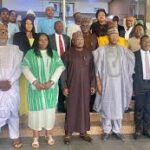The fact that I have to write this makes me retch. It turns my stomach because this is the 21st century, and there are still many among us who still think in this brutally savage way about other people, who they have to dehumanize in order to feel alive themselves. That I have to defend the Igbo, and being Igbo, makes me doubly conscious, and it is a feeling that compels one to reexamine once more, the contradictions of being Nigerian.
The new nations in Africa are creations of one of modernity’s most complex situations: colonialism. It brought many disparate cultural and political entities into filiation that in many cases have remained uncertain and fragile. That has always been one of the core criticisms of those who believe, and argue that Nigeria must end; divided, and each part pulling away towards its own sovereign goals. Nigeria was created formally in 1914, from the unification of three colonial administrations: the Southern and Northern protectorates and the colony of Lagos. But the history of the settling of Nigeria goes further back to the turn of the century when the Caliph of Sokoto was killed by the British in 1902, effectively bringing to the end, the Sokoto Caliphate.
The Yoruba kings themselves were the ones who wrote to the British to come and colonize the Yoruba to effectively end the one hundred years civil wars raging among the various parts of what is now Yoruba land. Of these entities, it was the Igbo who were the most difficult to colonize. They fought numerous battles of resistance from 1900 to 1930, when the High priest EzeNri Obalike, according to historians, was first brought to the court at Awka. However, long before colonization, the transatlantic trade had created a mobility which saw many groups interacting, displaced, uprooted, and settling in various places of what is today’s Nigeria.
The Igbo have always been a mobile and itinerant people; settling new frontiers. There is the story of an Igbo man who traveled by sea, through Bonny to Sierra Leone with his brother, and settled in Bathurst, Gambia by 1840, long before the Lagos colony was founded, in 1861. His son would become the first African to earn a law degree from Oxford, and Gambia’s first Chief Justice.The first Igbo Union was founded in Gambia in 1842. His son created new relations. There is still a place called Ibo Town today in Gambia. The coastal cities in West Africa were Atlantic cities, and centers of trade. They were sites of movements, and settlements. A city like Lagos is one such example. There is still a place called “Oyingbo” today in Lagos, which was long settled by Igbo already trading as far back as the 15th century in Lagos. Among the original founders of Lagos were Igbo, particularly the Igbere, and the Abam, and the Aro, who were very active in the transatlantic trade. I have in fact argued that if the DNA of members of the Eletu Odigbo family of Lagos is taken, they might be shocked where it roots them.
The Igbo were settlers in Lagos, long before many from mainland Yoruba land came to Lagos. The Igbo were already settled in Lagos, even while Yoruba traders were required to pay entry tolls to trade in Lagos. I always give this example: Obededom Azikiwe-Nnamdi Azikiwe’s father – was a civil servant in Lagos; as Chief clerk in the colonial administration, he was one of the so-called African colonial elites in Lagos. His son, Nnamdi Azikiwe, Nigeria’s founding president, and leader of the anti-colonial Nationalist movement was a Lagosian, in the true sense of the word. He lived and schooled, and worked in Lagos. He was in Lagos long, long before the man who became leader of the Yoruba, Obafemi Awolowo, first set foot in Lagos. I give all these backgrounds, and make the analogies, just simply to show how ridiculous is the call by a so-called Yoruba group asking the Igbo to leave Lagos.
The “Igbo Must Go” movement is not only ridiculous; it is strange and impossible to effect. The Igbo must leave to where? Lagos is now part of the heritage of the Igbo by all considerations. Historically, the Igbo have long settled in Lagos. Politically, the Igbo are citizens of the federation of Nigeria of which Lagos is still part. The Igbo are also invested in Lagos. Igbo capital is a key element in the growth and development of Lagos. Natural Resources have been exploited from the East of Nigeria, where the Igbo are largely domiciled, to create the prosperity of Lagos. The presumption that the Yoruba “owns” Lagos is not only vexatious, it flies in the face of both practical considerations, and historical considerations. But let us even come to this call for the Igbo to leave Lagos. So, if they do not leave, what happens? Will the organizers of this cowardly, primitive call fall upon them? Bring out Oro and attack the Igbo? Well, their deadline is coming, and I want to see them enforce their threat.
I want to see the Federal government watch a group of madcaps set upon the Igbo of Lagos without appropriate response. I am glad that the Governor of Lagos dissociated himself, his administration and the right-thinking Yoruba from this ploy, and its threat to conduct genocide. I feel certain that many Yoruba folks have nothing to do with this idiotic call for the Igbo to leave Lagos, and may actually be embarrassed by it. To those categories of Yoruba – the wise, worldly, and fair Yoruba that many of us associate with and know – this point is moot. But to the leaders of this Yoruba Nazi group, who are threatening death to the Igbo, whose only sin is that they are Igbo, and are engaged only in the simple fact of living their lives in Lagos, we must dare to tell them to be sure to look at Rwanda. The end of the story is not always its beginning.
It is also for the world to note that the Igbo are once again, under threat by members of an ultra-nationalist, ethnic terrorist group intend on carrying out the genocide of the Igbo in Lagos. But the Igbo are not going anywhere. The Igbo are in Lagos, and Lagos is in the Igbo. The Igbo are Lagos. They have the right to their lives and properties and must be protected by the government of Lagos. If the government of Lagos fails, by the Federal government of Nigeria. If the federal government of Nigeria fails, then the Igbo have a right, and an obligation to their own self defence, and must carry out appropriate and extreme measures against those threatening them.
I should therefore use this medium to warn: many Nigerians do not know the extent of Igbo anger, and long restraint, which is tried daily. They have been targets of selective violence in Lagos. Within the Igbo network have been discussions, restraints, and calls for patience, because the Igbo have experienced war, and have recoiled from it. As a result of Igbo restraint, a lot of people mistake it for Igbo inability to act. But let me again warn of the risk of daring the Igbo to a real fight. Those threatening the Igbo must understand that the Igbo are very organized. The Igbo are not afraid of a fight. The Igbo just prefer peace. Peace is important to the Igbo because it is under peaceable situations that business thrives. The Igbo have also fought a modern civil war and have known the bitter taste of it, and so, they are a little more wary of baying for blood.
Only those who have not seen war, and who have not heard the shattering roar of artillery will be leading this “Igbo Must go” Movement. They have no idea the beast they are about to unleash, should they dare the Igbo in Lagos. I have said the Igbo are angry. But I have said very thoughtful Igbo have ensured that the Igbo communities living in every part of the Nigerian federation continue to toe the line of peace, good neighborliness, and restraint. Peace is good for business. That does not however guarantee that the Igbo will continue to restrain themselves when they are threatened, with all the violence unleashed on them; all the destruction of their property in Lagos or elsewhere.
At some point, the voices of restraint will grow silent, and a new generation of Igbo, carrying deep historical anger in their soul, will unleash it with extreme consequence. Its impact on Nigeria will be horrendous. Nobody should threaten the Igbo in Lagos. The attack on the Igbo needs to stop. In any case, this “Igbo Must Go,” thing feels like a sick joke. The Igbo are not leaving Lagos. Lagos belongs to the Igbo as it belongs to every single Nigerian. Nigeria is a nation; with a full sovereign national will and boundary under a constitution.
The Nigerian constitution grants any citizen of Nigeria the right to live freely, in any part of the nation existing within the bounds of the nation. Thus, any ethnic group claiming absolute ownership of any part of Nigeria is a joke. Those who say the Igbo should leave Lagos are jokers.
First published in Orbit, Prof. Obi Nwakanma’s weekly column in Vanguard.



























